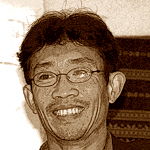../Paris 8/UFR7/Aide psychologique aux familles migrantes/EA2034

../Paris 8/UFR7/Aide psychologique aux familles migrantes/EA2034
|
Auteur |
 |
Ernest Sinchan |
|
Titre |
Psychopathologie et identité des Hakkas de Polynésie française |
|
|
Diplôme |
Thèse de doctorat en Psychologie [Psychologie Clinique et Psychopathologie] |
|
|
Directeur de recherche |
Tobie Nathan |
|
|
Jury |
Tobie Nathan (Paris 8, directeur de la thèse), Alain Blanchet (Paris 8), Serban Ionescu (Paris 5), Ling Fang (Collège de France), Alain Houlou (Lille 2, rapporteur), Bruno Saura (Université du Pacifique, rapporteur). |
|
|
Date de soutenance |
13
novembre 2002
|
|
|
Décision |
Mention très honorable, félicitations du jury.
|
|
| RÉSUMÉ |
Cette recherche traite de la question en Polynésie française de l’évolution identitaire des Hakka, de la persistance ou non de leurs éléments culturels, et du maintien ou non de leurs méthodes et objets de fabrication. Elle s’appuie dans une première partie sur des données historiques, sociologiques, psychosociologiques et principalement anthropologiques pour confirmer l’existence d’une identité spécifique aux Hakka de Polynésie française. L’approche psycho-pathologique et clinique sera le point fort de ce travail. L’identification des étiologies hakka témoigne d’une présence de l’esprit et de la pensée hakka, posant ainsi les prémices d’une théorisation d’une psychopathologie et d’une psychothérapie hakka à partir de fragments d’observations et d’analyses cliniques. Elle vient questionner le clinicien sur la façon dont il peut introduire l’univers culturel qui clôture le psychisme du Hakka dans la technique psychothérapique, validant en ce sens l’approche ethnopsychiatrique. Sont traités les processus d’initiation, de filiation d’affiliation, de ré-affiliation et de retour des Hakka dans leur groupe originel suite à des désordres. Ce travail nous conduit à l’objet permanent et sacré des Hakka : le Siang ou nom originel de l’Ancêtre fondateur (A Kung T’eu) déposé en eux, d’où s’organise leur intériorité psychique et culturelle. Nourrir et ancestraliser ses morts, nourrir son Ancêtre fondateur, c’est nourrir son Siang, nom patronymique de sa lignée et le fortifier. Ils viendront ainsi protéger la descendance de la lignée et leur assurer une vie meilleure.
SUMMARY
This research treats of the evolution of Hakka’s identity in French Polynesia, of the persistence or not of their cultural elements, and of the maintenance or not of their methods and objects of fabrication. In the first part, the historical, sociological, psychosociological and mainly anthropological data confirm the existence of a Hakka’s identity and ethnicity in French Polynesia. The clinical and psychopathological approach will be the strong part of this research. Identification of Hakka’s etiologies shows the presence of a Hakka’s spirit and thought, announcing the beginnings of theorisation of a Hakka’s psychopathology and psychotherapy from fragments of clinical observation and analysis. So it raises questions for the clinician as to the manner by which he may introduce the cultural universe which closes Hakka’s psychism into psychothérapeutic techniques, validating in this way the ethnopsychiatric approach. The process of the Hakka’s initiation, filiation, affiliation and re-affiliation are treated, and their return to their group too, after disorders. The permanent and sacred Hakka’s object : the Siang or original name of the founding ancestor (A Kung T’eu), put inside them, from which their psychic and cultural interiority will be asserted. Feeding and ancestralizing their dead, feeding his founding ancestor, it is feeding and strenghthening his Siang, the patronymic name of his lineage. They will come to protect the descendance of the lineage and to assure them of a better life.
Droits de diffusion et de reproduction réservés © 2002, Centre Georges Devereux
retour au site du Centre Georges Devereux :